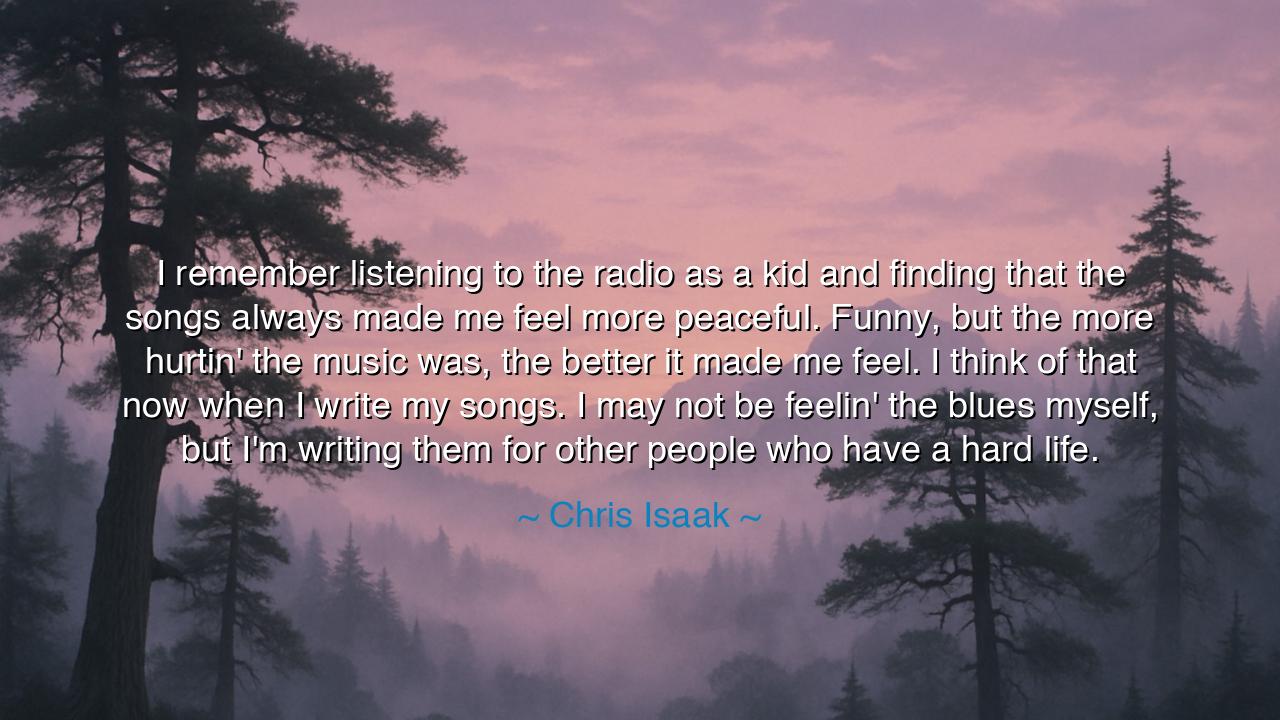
I remember listening to the radio as a kid and finding that the
I remember listening to the radio as a kid and finding that the songs always made me feel more peaceful. Funny, but the more hurtin' the music was, the better it made me feel. I think of that now when I write my songs. I may not be feelin' the blues myself, but I'm writing them for other people who have a hard life.






“I remember listening to the radio as a kid and finding that the songs always made me feel more peaceful. Funny, but the more hurtin’ the music was, the better it made me feel. I think of that now when I write my songs. I may not be feelin’ the blues myself, but I'm writing them for other people who have a hard life.” – Chris Isaak
In these gentle and haunting words, Chris Isaak unveils a timeless truth that every artist, poet, and dreamer has felt within their soul — that pain has the power to heal, and that sorrow, when given voice, becomes a form of mercy. As a child, he listened to the radio and found peace not in cheerful tunes, but in “hurtin’ music,” the kind that sang of heartbreak, longing, and loss. This paradox — that pain can soothe, that melancholy can mend — reveals one of the oldest mysteries of the human spirit. For when art speaks our sadness aloud, we no longer bear it alone.
Isaak’s reflection is more than nostalgia; it is a philosophy of compassion. When he says, “I may not be feelin’ the blues myself, but I'm writing them for other people who have a hard life,” he speaks as a healer disguised as a musician. The artist becomes a vessel, taking upon himself the sorrow of others and giving it shape through song. This, the ancients knew, was the sacred duty of the bard — to bear witness to the human condition, to turn grief into beauty so that others might find strength. In such creation, the artist does not escape pain but transforms it into something eternal and kind.
Long ago, the great philosopher Aristotle called this transformation catharsis — the purging of emotion through art. He taught that tragedy, far from being mere sadness, was a medicine for the soul. By watching or hearing the sufferings of others expressed with beauty, the audience was cleansed of its own turmoil. So it is with Isaak’s “hurtin’ music.” The blues, though born of hardship, offer relief precisely because they give sorrow its proper language. In the voicing of pain, we find peace — for silence is what truly breaks the heart.
This truth has echoed throughout history. When Billie Holiday sang “Strange Fruit,” her voice carried the grief of generations. The song’s beauty did not erase its horror — it made it bearable. When Beethoven, deaf and despairing, composed his Ninth Symphony, he poured his agony into sound, and through that suffering created one of the most transcendent works in human history. These artists, like Isaak, understood that music is empathy made audible. It is the bridge between one person’s sorrow and another’s salvation.
There is also humility in Isaak’s words — the recognition that one need not be in pain to understand it. He writes for those “who have a hard life,” not out of pity, but out of solidarity. The artist’s gift is not self-expression alone, but communion — the ability to feel beyond oneself. Even when his own life is light, Isaak remembers the darkness that others face. This remembrance is what gives his music soul. For the truest compassion does not wait until we suffer; it sings for others even in our own peace.
The paradox of “hurtin’ music” — that it makes us feel better — reflects something profoundly human. We are not healed by forgetting pain, but by sharing it. When we hear a song that speaks our heartbreak, it tells us we are not alone in the storm. It reminds us that others have wept, and yet survived. The notes become companions; the voice, a friend. Thus, the blues are not songs of despair, but of endurance. They say: Yes, life hurts. But still, we sing.
So, let this be the lesson of Chris Isaak’s wisdom: art is not escape, but redemption. When you feel sorrow, do not hide from it — listen, create, or share it. For in giving pain a name, you give it release. And when you see others in darkness, do as Isaak does: make something beautiful for them. You may not be feeling the blues yourself, but your compassion can become their melody. Remember, the world does not need fewer tears — it needs more songs to hold them.
For as long as humankind has drawn breath, the wounded have sung. And from those songs, generations have found peace. So, when next you hear a sad song that brings comfort, do not wonder at the paradox. It is simply the music of the soul healing itself — proof that even in sorrow, beauty lives, and through beauty, love endures.






AAdministratorAdministrator
Welcome, honored guests. Please leave a comment, we will respond soon